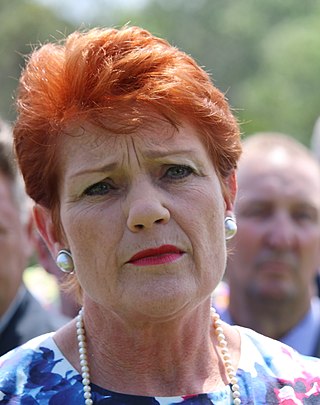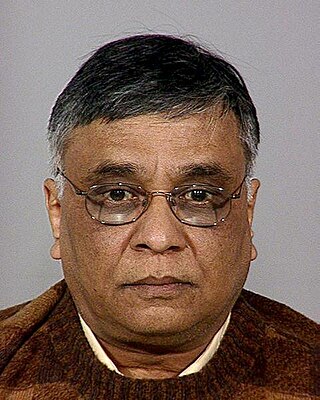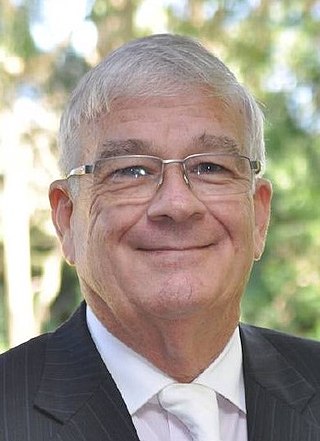Related Research Articles
In jurisprudence,double jeopardy is a procedural defence that prevents an accused person from being tried again on the same charges following an acquittal or conviction and in rare cases prosecutorial and/or judge misconduct in the same jurisdiction. Double jeopardy is a common concept in criminal law –in civil law,a similar concept is that of res judicata. The double jeopardy protection in criminal prosecutions bars only an identical prosecution for the same offence except when the defendant is a servicemember as the courts have ruled that the military courts are a separate sovereign,therefore servicemembers can be held in two separate trials for the exact same charges;however,a different offence may be charged on identical evidence at a second trial. Res judicata protection is stronger –it precludes any causes of action or claims that arise from a previously litigated subject matter.

Pauline Lee Hanson is an Australian politician who is the founder and leader of One Nation,a right-wing populist political party. Hanson has represented Queensland in the Australian Senate since the 2016 Federal Election.

Pauline Hanson's One Nation,also known as One Nation or One Nation Party,is a right-wing populist political party in Australia. It is led by Pauline Hanson.
David Ernest Oldfield is an Australian former politician who co-founded and was national director of the Pauline Hanson's One Nation party.

The Serious Fraud Office (SFO) is a non-ministerial government department of the Government of the United Kingdom that investigates and prosecutes serious or complex fraud and corruption in England,Wales and Northern Ireland. The SFO is accountable to the Attorney General for England and Wales,and was established by the Criminal Justice Act 1987,an Act of the Parliament of the United Kingdom.

The Theft Act 1968 is an act of the Parliament of the United Kingdom. It creates a number of offences against property in England and Wales.
The following lists events that happened during 2003 in Australia.

Jayant Mukundray Patel is an Indian-born American surgeon who was accused of gross negligence whilst working at Bundaberg Base Hospital in Queensland,Australia. Deaths of some of Patel's patients led to widespread publicity in 2005. In June 2010,he was convicted of three counts of manslaughter and one case of grievous bodily harm,and sentenced to seven years' imprisonment. In August 2012,all convictions were quashed by the full bench of the High Court of Australia and a retrial was ordered due to "highly emotive and prejudicial evidence that was irrelevant to the case" laid before the jury. A retrial for one of the manslaughter counts resulted in acquittal and led to a plea deal where Patel pleaded guilty to fraud and the remaining charges were dropped. On May 15,2015,he was barred from practising medicine in Australia.

In England and Wales,a magistrates' court is a lower court which hears matters relating to summary offences and some triable either-way matters. Some civil law issues are also decided here,notably family proceedings. In 2010,there were 320 magistrates' courts in England and Wales;by 2020,a decade later,164 of those had closed. The jurisdiction of magistrates' courts and rules governing them are set out in the Magistrates' Courts Act 1980.
The City Country Alliance (CCA),initially known as One Nation Queensland,was a short-lived Australian political party,operating exclusively in Queensland,that briefly held six Queensland state parliamentary seats. It was founded in the wake of Pauline Hanson's One Nation experiencing severe ructions in Queensland,the home state of founder Pauline Hanson.

The criminal law of Canada is under the exclusive legislative jurisdiction of the Parliament of Canada. The power to enact criminal law is derived from section 91(27) of the Constitution Act,1867. Most criminal laws have been codified in the Criminal Code,as well as the Controlled Drugs and Substances Act,Youth Criminal Justice Act and several other peripheral statutes.
In criminal law,a conspiracy is an agreement between two or more people to commit a crime at some time in the future. Criminal law in some countries or for some conspiracies may require that at least one overt act be undertaken in furtherance of that agreement,to constitute an offense. There is no limit to the number participating in the conspiracy and,in most countries,the plan itself is the crime,so there is no requirement that any steps have been taken to put the plan into effect. For the purposes of concurrence,the actus reus is a continuing one and parties may join the plot later and incur joint liability and conspiracy can be charged where the co-conspirators have been acquitted or cannot be traced. Finally,repentance by one or more parties does not affect liability but may reduce their sentence.

The Fraud Act 2006 is an Act of the Parliament of the United Kingdom which affects England and Wales and Northern Ireland. It was given royal assent on 8 November 2006,and came into effect on 15 January 2007.
Diane McGrath Fingleton is a former magistrate in the Queensland Magistrates Court,most notable for being appointed Chief Magistrate and later being convicted of the offence of intimidation of a witness,before the conviction was quashed on appeal to the High Court of Australia.

The Serious Crime Act 2007 is an Act of the Parliament of the United Kingdom that makes several radical changes to English criminal law. In particular,it creates a new scheme of serious crime prevention orders to frustrate crime in England and Wales and in Northern Ireland,replaces the common law crime of incitement with a statutory offence of encouraging or assisting crime,makes provision as to disclosure and information sharing in order to prevent fraud,and abolishes the Assets Recovery Agency creating a new regime for the recovery of the proceeds of crime.

R v Paul Chambers,popularly known as the Twitter Joke Trial,was a United Kingdom legal case centred on the conviction of a man under the Communications Act 2003 for posting a joke about destroying an airport on Twitter,a message which police regarded as "menacing". The conviction in the Magistrates' court was widely condemned as a miscarriage of justice,but was upheld on appeal to the Crown Court. Chambers appealed against the Crown Court decision to the High Court,which would ultimately quash the conviction.
Rodney Norman Culleton is an Australian politician who was sworn in and sat as a Senator for Western Australia following the 2016 federal election. At that time he was a member of the Pauline Hanson's One Nation party,but on 18 December 2016 he resigned from the party to sit as an independent.

Brian Burston is a former Australian politician. He was a Senator for New South Wales from 2016 to 2019,originally representing One Nation. After falling out with party leader Pauline Hanson over company tax cuts,Burston left One Nation and joined businessman Clive Palmer's newly relaunched United Australia Party. Palmer announced Burston as the new parliamentary leader of the party on 18 June 2018,but Burston failed to win re-election at the 2019 federal election.
James Hunter Ashby is an Australian political advisor and former radio presenter. In 2012,he made allegations of sexual harassment against the former Speaker of the House,Peter Slipper,triggering a political scandal. He is currently the chief of staff for Pauline Hanson,the leader of Pauline Hanson's One Nation political party,and the state leader of One Nation Queensland. He led the party in the 2024 Queensland state election.

Pell v The Queen was a High Court of Australia decision that overturned the conviction of Cardinal George Pell for sexual offences against a child. On 22 June 2017,Victoria Police announced Pell's arrest for historical sexual assault charges on two choirboys at St Patrick's Cathedral in Melbourne. The allegations stemmed from Pell's time spent as Archbishop of Melbourne,and pertained to two anonymous victims referred to throughout the court process as victim A and victim B. B died before any allegation was reported to police. Pell was tried twice in the County Court of Victoria.
References
- 1 2 Martin Lehmann (24 March 2005). "Consider Your Verdict – David Ettridge's gripping new book".
- ↑ "One Nation founder's conviction quashed". The Scotsman. Edinburgh. 7 November 2003. Archived from the original on 22 October 2012.
- ↑ de Jersey CJ, McMurdo P and Davies JA (6 November 2003). "R v Hanson; R v Ettridge [2003] QCA 488" (PDF). Supreme Court of Queensland. Archived from the original (PDF) on 29 October 2005. Retrieved 25 April 2007.
- ↑ Consider your verdict ( ISBN 174110232-4) published by New Holland Publishers Pty, Limited
- ↑ "One Nation co-founder accuses party of abandoning him". ABC News. 4 April 2017. Retrieved 4 April 2017.